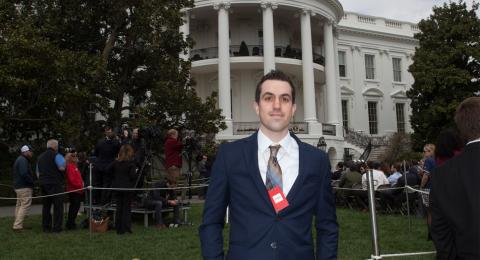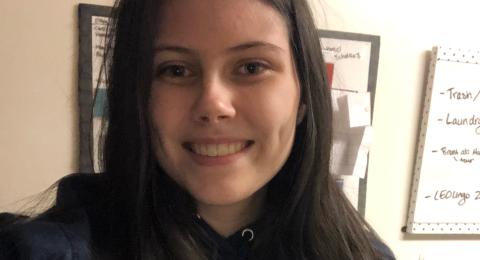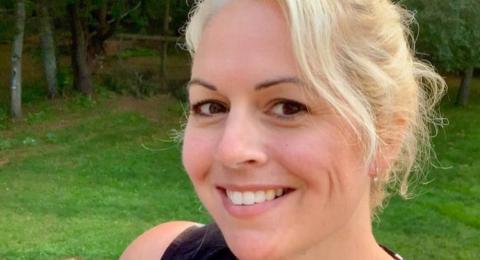The Journalism major at UNH equips students with the essential skills to thrive as reports who provide clear, factual and concise stories that deliver the information on which the public relies. Journalists are trained to cut through the noise and ask questions that elicit significant answers that simplify the complicated. From your first journalism class, you'll be out in the field reporting and writing. The program offers internships, study-abroad opportunities in London, and the Donald Murray Visiting Journalist Program, which brings accomplished journalists to campus for week-long residencies where they lecture, conduct classes and work with students in various forms of media.
What is journalism?
Our democracy depends on journalists who can cut through the noise and find the information upon which the public relies. Journalists are trained to report deeply, behave ethically, and write clearly and compellingly. News platforms, both print and digital, are changing rapidly, yet the heart of journalism — fact gathering, observing, writing and editing — remains the same, whether you’re composing a multimedia slideshow or a page-one feature. The UNH journalism program teaches you to ask questions that elicit significant answers, to simplify the complicated and to use the digital tools needed to thrive in newsrooms. Most importantly, the program teaches you to become a great storyteller.
Why study journalism at UNH?
writers and editors. From the first week of your first journalism course, you’ll be out reporting and writing, eventually practicing other skills such as using social media to share stories, shooting video and still photography, editing copy and writing headlines. You’ll have the opportunity to pursue internships with multiple media outlets. Our study-abroad programs let you study in London. Additionally, the Donald Murray Visiting Journalist Program brings accomplished journalists to campus for week long residencies during which they lecture, conduct classes and work with students and student media.
Potential careers
- Content curator
- Editor
- Media strategist
- Political advisor
- Public relations specialist
- Reporter
- Social media specialist
- Teacher
- Television producer
- Web content creator
Curriculum & Requirements
In our digital age, the ability to evaluate, edit, package and communicate information has become crucial to many, if not most, careers. Founded on the study of literature, the oldest form of story-telling, our English/journalism major prepares students for success in the media or any vocation that requires strong research and communications skills. Learn the basics: interviewing, fact gathering, verification and writing in both news and feature styles. Then broaden your repertoire by producing stories for digital platforms using audio, photo, video and data visualization.
Students interested in the English/journalism major should see Carla Cannizzaro, Senior Academic Advisor, Department of English, 230F Hamilton Smith Hall, (603) 862-1313, or the director of the Journalism Program, Prof. Tom Haines.
Degree Requirements
All Major, Option and Elective Requirements as indicated.
*Major GPA requirements as indicated.
Major Requirements
English/journalism majors must complete ENGL 401 First-Year Writing before taking the first journalism course, ENGL 534 21st Century Journalism: How the News Works. After completing ENGL 534 21st Century Journalism: How the News Works, majors may move on to ENGL 621 Newswriting. Journalism majors must complete classes taken for major credit with a grade of C- or better, with the exception of ENGL 419 How to Read Anything and the course taken for Capstone credit.
| Code | Title | Credits |
|---|---|---|
| ENGL 401 | First-Year Writing | 4 |
| ENGL 419 | How to Read Anything 1 | 4 |
| Select one pre-1800 literature course (select from list below) | 4 | |
| Select one post-1800 literature course (select from list below) | 4 | |
| Select one course that addresses Community and Cultures (select from list below) | 4 | |
| Select one additional ENGL course at the 500, 600 or 700 level. Any English course may be used to satisfy this requirement except courses with a journalism focus (see list of excluded courses in footnote) 2 | 4 | |
| ENGL 534 | 21st Century Journalism: How the News Works | 4 |
| ENGL 621 | Newswriting | 4 |
| Select three additional journalism courses from the following: | 12 | |
ENGL 623 | Creative Nonfiction | |
ENGL 631 | Digital Reporting | |
ENGL 703T | Travel Writing | |
ENGL 711 | Editing | |
ENGL 712 | Multimedia Storytelling | |
ENGL 721 | Advanced Reporting | |
ENGL 722 | Feature Writing | |
| Capstone: Any English course at the 700 level (except ENGL 795). 3 | 4 | |
- 1
Must be completed with a minimum grade of C. ENGL 419 How to Read Anything is the only 400-level class that may count towards the English/Journalism major. ENGL 415s, "Literature and..." courses, and ENGL 444s will NOT count towards this major.
- 2
English courses with a journalism focus are ENGL 534, ENGL 621, ENGL 623, ENGL 631, ENGL 703T, ENGL 711, ENGL 712, ENGL 720, ENGL 721, ENGL 722, ENGL 725.
- 3
Capstone course may not be double-counted towards other major requirement areas. Minimum grade required: C. ENGL 788 Senior Honors written as part of the English Honors in Major program may be used as a Capstone course. Students must submit a Capstone Declaration form at the time of registration. Capstone course credit may not be applied retroactively.
| Code | Title | Credits |
|---|---|---|
| Pre-1800 Literature Courses | ||
ENGL 512 | British Literature I Age of Heroes: Beowulf to Dr. Faustus | |
or ENGL 513W | British Literature II Age of Revolutions: Shakespeare to Austen | |
ENGL 595 | Literary Topics (if topic is appropriate) | |
ENGL 657 | Shakespeare | |
ENGL 693R | Special Topics in Literature (if topic is appropriate) | |
ENGL 751 | Medieval Romance | |
ENGL 756 | Chaucer | |
ENGL 758 | Advanced Shakespeare | |
ENGL 759 | Milton | |
ENGL 787 | English Major Seminar (if topic is appropriate) | |
| Code | Title | Credits |
|---|---|---|
| Post-1800 Literature Courses | ||
ENGL 514W | British Literature III: Revolts, Renewals, Migrations | |
or ENGL 516W | American Literature II Money, Migration, and Modernity: Huck Finn to Beloved | |
ENGL 595 | Literary Topics (if topic is appropriate) | |
ENGL 690 | African American Literature | |
ENGL 693R | Special Topics in Literature (if topic is appropriate) | |
ENGL 738 | Asian American Studies | |
ENGL 773 | Literary Modernisms: Return, Revolt, Recycle | |
ENGL 775 | Modern Irish Literature: A Changing Landscape | |
ENGL 777 | The English Novel in the World | |
ENGL 782 | Modern and Contemporary Drama | |
ENGL 784 | English Novel of the 19th Century | |
ENGL 787 | English Major Seminar (if topic is appropriate) | |
ENGL 797R | Special Studies in Literature (Race & Racial Theories) (if topic is appropriate) | |
| Code | Title | Credits |
|---|---|---|
| Community and Cultures Courses | ||
ENGL 440A | Honors/On Race in Culture and Society | |
ENGL 550 | Introduction to the Literature and Culture of Race | |
ENGL 560 | Introduction to Latinx Literature and Culture | |
ENGL 650R | I Hear America Singing: Studying American Literature and Culture | |
ENGL 690 | African American Literature | |
ENGL 693 | Special Topics in Literature (subtopic R) | |
ENGL 693R | Special Topics in Literature | |
ENGL 738 | Asian American Studies | |
ENGL 778 | Race and Gender in Film and Popular Culture | |
ENGL 797R | Special Studies in Literature (Race & Racial Theories) | |
(Note: the course used to fulfill this requirement may be double counted as one of the pre-1800 and post-1800 literature courses required for this major.)
Please see your advisor if you have questions about other courses that might fulfill these requirements.
Certain courses publish student writing digitally, at times in collaboration with professional news outlets. Students are also encouraged to write and edit for student publications such as The New Hampshire and Main Street Magazine.
Candidates for a degree must satisfy all of the University Discovery Program requirements in addition to satisfying the requirements of each individual major program. Bachelor of arts candidates must also satisfy the foreign language proficiency requirement.
English/journalism majors may use one major-required course to satisfy one Discovery category requirement.
Majors may only count one online course toward their English major requirements.
All undergraduate English majors acquire the same core skills. These include:
- Proficiency in analytical writing, critical thinking, and public-speaking.
- Knowledge of important literary genres and subgenres
- Fluency in literary terminology,
- A broad understanding of British-and-American literature, from the medieval period in England and the moment of first contact in America to the present day.
- Demonstrated proficiency in writing an analytical essay that offers a sophisticated close-reading or explication of a literary text. This essay will have a clear thesis and proceed in a logical fashion, with interpretive claims supported by evidence from the text.
- Demonstrated proficiency in literary research and in writing an extended thesis-driven research paper in which sources are correctly and responsibly cited.
- Demonstrated understanding of how to read across the color line in the US and /or how to analyze literary works written in English from outside the UK and the US--from India, Africa, and the Caribbean, for example.
Students in our major tracks acquire the following specialized skills. English /Journalism majors will be able to:
- Demonstrate proficiency in a wide range of reporting skills (i.e., finding trends, understanding context, editing, and so forth).
- Find and interview credible sources.
- Know how to write feature articles, profiles, and other kinds of news stories.
Explore Program Details
Why Major in Journalism?
For all of you who fear that Twitter and Facebook and blogging have replaced the need for professional journalists, think again. Because so much information inundates us every day, there is more of a need for journalists than ever. As professionals trained to recognize what’s important, report deeply, behave ethically, and write clearly and compellingly, journalists perform the essential task of deciphering the information upon which our democracy depends.
What have changed are the mediums used to deliver news. How strong a role traditional newspapers and magazines – or radio or TV for that matter – will play in the future is anyone’s guess, but what is clear is the need for journalists to provide the stories that help us understand our world. The heart of the work – the interviewing, fact gathering, observing, writing, and editing – remains the same whether you are composing a multimedia slideshow or a Page One feature, and it is upon those skills that the UNH Journalism Program is built. We will teach you to understand news. We will teach you to ask the questions that will elicit answers. We will teach you to simplify the complicated. Most important, we will teach you to become storytellers.
Today’s students will determine the future of journalism. That’s an awesome responsibility and an incredible opportunity. Don’t hesitate to start the adventure now.
The UNH Advantage
At many universities, the journalism major is part of the communications department, where courses emphasize theory and combine journalism with advertising or public relations. At UNH, the English/journalism major is part of the English department. The courses focus on reporting, writing and editing. (UNH also has a communication department, where you can take theory courses.)
No journalism class is larger than 20 students, and many are smaller. In all of the writing courses, students have frequent individual conferences with their instructors in addition to the class time, a technique pioneered at UNH and now used around the world (though rarely in journalism education). The small classes and constant instructor contact are among the reasons UNH journalism grads are so loyal to the program and keep in touch with one another -- and keep hiring one another -- for years after they graduate.
Whether you want to work in print, broadcast, or online journalism, the skills you learn at UNH will get your future started.
Can I minor in Journalism?
There is no such thing as a journalism minor at UNH, but you can be an English minor and take mostly journalism courses. All you need for an English minor is five English courses: two numbered in the 500's and three numbered 600 or above. So if you want to concentrate on journalism, take ENGL 534, 21st Century Journalism: How the News Works as one of your 500's, and then any three journalism courses you want. We're also happy to have you take journalism courses even if you're not an English major or minor.
English/Journalism Major Capstone Experience:
The Internship
As a requirement to graduate, each student in the English/Journalism Major completes an internship that provides a chance to put journalistic skills into practice and to acquire valuable real-world experience. Think of it as a big stepping stone toward finding a job and building a life after graduation from UNH.
The internship (counted for credit as English 720) can range from part-time work a day or two a week to a full-time, semester-long opportunity. Many students find it a rewarding conclusion to their academic studies and on-campus reporting and consider it a highlight of their time in the Journalism Program.
The UNH Journalism Program has connections with many news organizations in the state – including WMUR-TV, NHPTV, New Hampshire Magazine, NHPR, the Granite State News Collaborative, and more – and we can help students connect for internship opportunities. But you are also free to cast a wider net, seeking internships near and far. The College of Liberal Arts Career and Professional Services office can help you prepare a resume and social media accounts and can help you research internship opportunities of your own.
We recommend a reporting, editing, or production internship in a working newsroom as the best experience, no matter what career path you expect to follow. Certainly, anyone serious about becoming a journalist should pursue at least one newsroom internship while at UNH. Yet other opportunities that require reporting and storytelling skills – working in public relations, digital communications, etc. – may also qualify for English 720 credit.
Most students do their internship late in the junior year or as a senior. We encourage you to begin thinking early about what kind of internship experience you hope to have and during which semester you’d like to do it.
Contact Tom Haines at tom.haines@unh.edu for more information.
Requirements:
• Students must complete English 621/Newswriting and English 631/Digital Reporting prior to enrolling in English 720/Internship.
• Students interested in editing internships must be doing ‘A’ work in English 711/Editing.
• Students may apply for an internship while enrolled in English 631 or 711.
• Students need three published news stories to apply for an internship.
• Prior to applying, students must complete a resume/social media consultation with COLA’s Career and Professional Services office.
How to Apply:
The Journalism Program organizes applications each October for Spring internships and each March for Summer and Fall internships. When ready to apply, email program director Tom Haines at tom.haines@unh.edu and include the following: English/Journalism classes completed and grades for each; the kind of internship you hope to do; links to three published stories.
UNH Journalism Scholarships
The English Department has other awards and scholarships for which journalism majors may be eligible.
Outside Journalism Scholarships
- Society of Professional Journalists grants, internships, fellowships and schoalrships
- Hearst Foundation awards
- Overseas Press Club Foundation Scholarship for students who want to become international correspondents
- Women in Communications scholarships for students from Connecticut, New York, New Jersey and Pennsylvania
- Alpha Omega Council offers a scholarship for Greek-Americans studying journalism
The Donald Murray Visiting Journalist Program is named in honor of the late Donald Murray, the Pulitzer Prize-winning writer who started the UNH journalism program in 1963. Terry Williams ’80, publisher of the Telegraph of Nashua, led the fundraising drive for the program, with primary support coming from The McLean Contributionship and from UNH journalism alumni. Sponsored by the journalism program, the Donald Murray Visiting Journalist Program brings accomplished alumni journalists to campus each year for week-long residencies during which they conduct classes, work with students and student media, and give a public lecture.
The Visiting Journalist program is sponsored by the UNH Journalism Program, the UNH English Department, the Telegraph of Nashua and the McLean Contributionship.
Support the UNH Journalism Program
Whether it's time, money, or advice for journalism students, we welcome your contributions. We rely on our network of alumni and friends to give back to the program that served them so well. Below are a few suggestions of ways you can help. If you have other ideas, great! Just let us know what you'd like to do.
Contribute to an Established UNH Journalism Fund
If you or your company is interested in contributing to the Michael Kelly scholarship fund, the Donald Murray Visiting Journalist Program, or any other aspect of journalism at UNH, contact any of us on the journalism faculty or click here to make a gift online. Choose "Other" and type in the name of the fund to which you would like to contribute. You may also give anonymously or in the memory of a loved one or friend.
- Michael Kelly Scholarship Fund
- Donald Murray Visiting Journalist Program
- Donald Murray Endowed Journalism Fund
We can’t say enough about what Don Murray did for UNH and for the journalism program he founded, not to mention his enormous impact on the teaching of writing around the world. After Don died in December 2006, his daughters generously decided that donations in their father’s name should benefit the UNH journalism program. You can contribute to the Don Murray Endowed Journalism fund to keep the journalism program strong.
Volunteer to Speak to a Journalism Class at UNH
Our students can learn a lot from you and your real-world experiences in the newsroom, boardroom and beyond. If interested, please send an e-mail to Lisa Miller or call her at (603) 862-1313.
Help Connect Us With Other Alumni
Take a moment to scan our Alumni Roster and help us keep in touch with our former students and friends!












